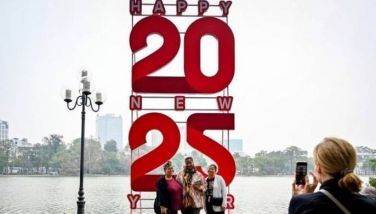World Bank 'deeply concerned,' pauses aid to Afghanistan

WASHINGTON, United States — The World Bank has suspended aid to Afghanistan, saying it is "deeply concerned" by the situation there, especially regarding women's rights, after the Taliban seized power, a bank spokesperson told AFP.
"We have paused disbursements in our operations in Afghanistan and we are closely monitoring and assessing the situation," the official said.
"We are deeply concerned about the situation in Afghanistan and the impact on the country's development prospects, especially for women."
The suspension follows the Taliban's swift takeover of Afghanistan, as US forces prepared to complete a withdrawal with a deadline of August 31.
Washington last week announced it would deny the Taliban access to the country's gold and cash reserves, most of which are held overseas.
The International Monetary Fund (IMF) also suspended operations with the country, including an existing $370 million loan program, as well as $340 million Kabul was due to receive from Monday's release of Special Drawing Rights (SDR), the lender's basket of currencies.
The swift takeover has led to heart-wrenching scenes of people trying to flee the country, including women fearing a return to the kind of Taliban rule of their 1990s regime that saw women confined to their homes, most entertainment banned, and stonings and public executions used as punishments.
The World Bank held off on making a statement until it had pulled all of its personnel out of the country, an operation completed on Friday, according to a bank source.
The spokesperson said the development lender "will continue to consult closely with the international community and development partners."
"Together with our partners, we are exploring ways we can remain engaged to preserve hard-won development gains and continue to support the people of Afghanistan."
The World Bank has more than two dozen development projects ongoing in the country and has provided $5.3 billion since 2002, mostly in grants, according to the bank's website.
Get the latest news as Taliban gains control of Afghanistan. Photo courtesy of Al Jazeera/AFP
Afghanistan's supreme leader said Sunday the country's women were being saved from "traditional oppressions" by the adoption of Islamic governance and their status as "free and dignified human beings" restored.
In a statement marking this week's Eid al-Adha holiday, Hibatullah Akhundzada -- who rarely appears in public and rules by decree from the Taliban's birthplace in Kandahar -- said steps had been taken to provide women with a "comfortable and prosperous life according to Islamic Sharia".
The United Nations expressed "deep concern" last week that women were being deprived of their rights under Afghanistan's Taliban government and warned of systematic gender apartheid.
Since returning to power in August 2021, Taliban authorities have stopped girls and women from attending high school or university, banned them from parks, gyms and public baths, and ordered them to cover up when leaving home.
They have also barred them from working for the UN or NGOs, while most female government employees have been dismissed from their jobs or are being paid to stay at home.
However, Akhundzada said "necessary steps have been taken for the betterment of women as half of the society".
"All institutions have been obliged to help women in securing marriage, inheritance and other rights," his statement read. — AFP
UN chief Antonio Guterres will gather international envoys at a secret location in Doha on Monday in an increasingly desperate bid to find ways to influence Afghanistan's Taliban rulers. — AFP
The UN Security Council adopted a resolution Thursday calling on Taliban authorities to "swiftly reverse" all restrictive measures against women, condemning in particular its ban on Afghan women working for the United Nations.
The resolution, unanimously adopted by all 15 Council members, said the ban announced in early April "undermines human rights and humanitarian principles."
More broadly, the Council called on the Taliban government to "swiftly reverse the policies and practices that restrict the enjoyment by women and girls of their human rights and fundamental freedoms."
It cited access to education, employment, freedom of movement, and "women's full, equal and meaningful participation in public life."
The Council also urged "all States and organizations to use their influence" to "promote an urgent reversal of these policies and practices." — AFP
G7 foreign ministers on Tuesday demanded the "immediate reversal" of a ban on women in Afghanistan working for non-governmental organisations and the United Nations.
"We call for the immediate reversal of unacceptable decisions restricting human rights and fundamental freedoms, including the latest bans prohibiting Afghan women from working for NGOs and the UN," the top diplomats said in a statement after two days of talks in Japan.
The group also slammed the Taliban authorities' "systematic abuses of human rights of women and girls and discrimination against the members of religious and ethnic minorities".
Taliban authorities triggered international outrage this month after extending a December ban on Afghan women working for non-governmental organisations to include the UN.
They have rejected criticism over the move, saying it is an internal issue that should be "respected by all sides." — AFP
The United Nations is being forced to make an "appalling choice" over whether to continue operations in Afghanistan while the Taliban government bans women from working for the organisation, the world body says.
Under their austere interpretation of Islam, Taliban authorities have imposed a slew of restrictions on Afghan women since seizing power in 2021, including banning them from higher education and many government jobs.
In December, they banned Afghan women from working for domestic and foreign non-governmental organisations, and on April 4 extended that to UN offices across the country.
In a statement Tuesday, the UN mission in Afghanistan said the ban was "unlawful under international law, including the UN Charter, and for that reason the United Nations cannot comply".
"Through this ban, the Taliban de facto authorities seek to force the United Nations into having to make an appalling choice between staying and delivering in support of the Afghan people and standing by the norms and principles we are duty-bound to uphold," it said. — AFP
- Latest
- Trending


































